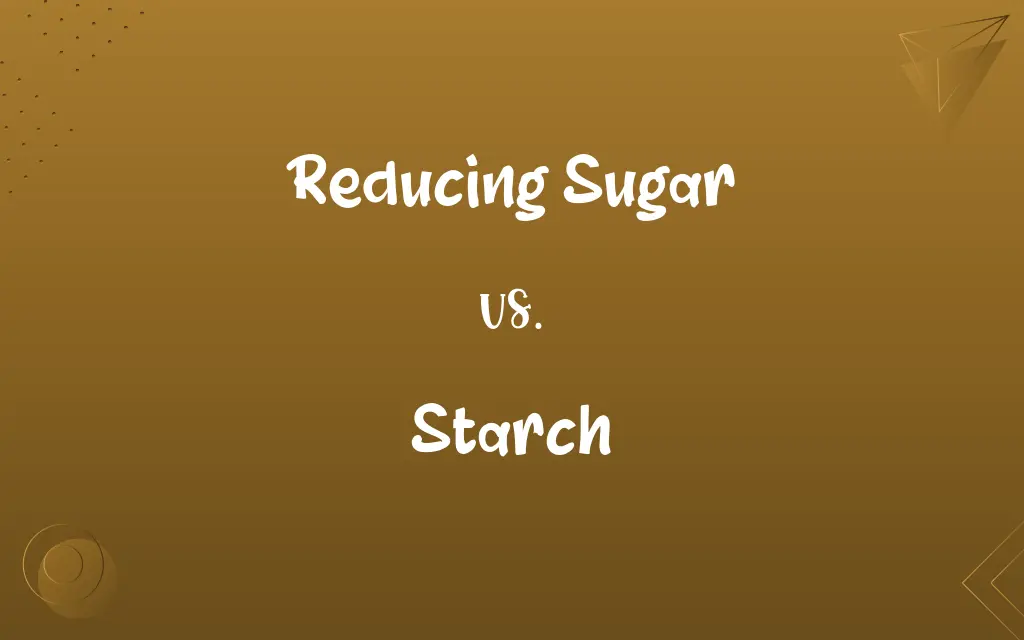Reducing Sugar vs. Starch: Know the Difference

By Shumaila Saeed || Published on December 28, 2023
Reducing sugars, such as glucose, can donate electrons in chemical reactions, while starch, a polysaccharide, is a non-reducing sugar used for energy storage in plants.

Key Differences
Reducing sugars possess free aldehyde or ketone groups that allow them to act as reducing agents, typically observed in simple sugars like glucose and fructose. In contrast, starch is a complex carbohydrate, composed of long chains of glucose units, primarily serving as an energy reserve in plants.
Shumaila Saeed
Dec 28, 2023
In chemical tests like Benedict's solution, reducing sugars give a positive result due to their ability to reduce copper ions, indicating the presence of free reactive groups. Starch, however, does not react in these tests as it lacks free aldehyde or ketone groups, reflecting its complex structure.
Shumaila Saeed
Dec 28, 2023
Reducing sugars play a crucial role in cellular respiration, providing immediate energy to cells. Starch, on the other hand, is insoluble and acts as a more long-term energy storage, slowly broken down into glucose when needed.
Shumaila Saeed
Dec 28, 2023
The dietary significance of reducing sugars includes providing quick energy and impacting blood sugar levels swiftly. Starch, being a complex carbohydrate, digests more slowly, providing sustained energy and having a more gradual effect on blood sugar levels.
Shumaila Saeed
Dec 28, 2023
In cooking, reducing sugars contribute to the browning of food through the Maillard reaction, while starch is often used as a thickening agent due to its ability to absorb water and swell, forming a gel-like consistency.
Shumaila Saeed
Dec 28, 2023
ADVERTISEMENT
Comparison Chart
Chemical Structure
Simple sugars with free aldehyde/ketone groups
Complex polysaccharides without free reactive groups
Shumaila Saeed
Dec 28, 2023
Role in Organisms
Immediate energy source, participates in cellular respiration
Long-term energy storage in plants
Shumaila Saeed
Dec 28, 2023
Chemical Reactivity
Can reduce other compounds (e.g., in Benedict's test)
Non-reactive in reducing sugar tests
Shumaila Saeed
Dec 28, 2023
Dietary Impact
Quick energy source, affects blood sugar rapidly
Slow digestion, gradual energy release
Shumaila Saeed
Dec 28, 2023
Cooking Uses
Promotes browning (Maillard reaction)
Used as a thickener due to water absorption
Shumaila Saeed
Dec 28, 2023
ADVERTISEMENT
Reducing Sugar and Starch Definitions
Reducing Sugar
A sugar capable of acting as a reducing agent.
Glucose, a reducing sugar, changes the color of Benedict's solution.
Shumaila Saeed
Dec 11, 2023
Starch
Insoluble carbohydrate, digesting slowly for sustained energy.
Starch in whole grains provides longer-lasting energy than simple sugars.
Shumaila Saeed
Dec 11, 2023
Reducing Sugar
Sugar that can donate electrons in chemical reactions.
Reducing sugars participate in the browning of baked goods.
Shumaila Saeed
Dec 11, 2023
Starch
Non-reducing sugar, not reactive in tests like Benedict's solution.
Starch does not react in the Benedict's test, unlike reducing sugars.
Shumaila Saeed
Dec 11, 2023
Reducing Sugar
A carbohydrate that tests positive with Benedict's reagent.
Milk contains lactose, a reducing sugar, which reacts with Benedict's solution.
Shumaila Saeed
Dec 11, 2023
ADVERTISEMENT
Starch
Used as a thickening agent in cooking due to its water absorption.
Cornstarch is commonly used to thicken sauces and gravies.
Shumaila Saeed
Dec 11, 2023
Reducing Sugar
Sugar contributing to quick energy supply in the diet.
Honey, rich in reducing sugars, provides immediate energy.
Shumaila Saeed
Dec 11, 2023
Starch
Complex carbohydrate, broken down into glucose when digested.
Starch in bread is gradually broken down into glucose during digestion.
Shumaila Saeed
Dec 11, 2023
Reducing Sugar
Simple sugar with free aldehyde or ketone group.
Fructose is a common reducing sugar in fruits.
Shumaila Saeed
Dec 11, 2023
Starch
A naturally abundant nutrient carbohydrate, (C6H10O5)n, found chiefly in the seeds, fruits, tubers, roots, and stem pith of plants, notably in corn, potatoes, wheat, and rice, and varying widely in appearance according to source but commonly prepared as a white amorphous tasteless powder.
Shumaila Saeed
Dec 10, 2023
Starch
Any of various substances, such as natural starch, used to stiffen cloth, as in laundering.
Shumaila Saeed
Dec 10, 2023
Starch
Starches Foods having a high content of starch, as rice, breads, and potatoes.
Shumaila Saeed
Dec 10, 2023
Starch
Stiff behavior
"Dobbs, the butler ... isn't as stiff as he used to be.
Ann, my brother's new wife, has loosened up his starch a bit" (Jennifer St. Giles).
Shumaila Saeed
Dec 10, 2023
Starch
Vigor; mettle
"Business travel can take the starch out of the most self-assured corporate titan" (Lisa Faye Kaplan).
Shumaila Saeed
Dec 10, 2023
Starch
(uncountable) A widely diffused vegetable substance, found especially in seeds, bulbs and tubers, as extracted (e.g. from potatoes, corn, rice, etc.) in the form of a white, glistening, granular or powdery substance, without taste or smell, and giving a very peculiar creaking sound when rubbed between the fingers. It is used as a food, in the production of commercial grape sugar, for stiffening linen in laundries, in making paste, etc.
Shumaila Saeed
Dec 10, 2023
Starch
(countable) Any of various starch-like substances used as a laundry stiffener
Shumaila Saeed
Dec 10, 2023
Starch
To apply or treat with laundry starch, to create a hard, smooth surface.
She starched her blouses.
Shumaila Saeed
Dec 10, 2023
Starch
A widely diffused vegetable substance found especially in seeds, bulbs, and tubers, and extracted (as from potatoes, corn, rice, etc.) as a white, glistening, granular or powdery substance, without taste or smell, and giving a very peculiar creaking sound when rubbed between the fingers. It is used as a food, in the production of commercial grape sugar, for stiffening linen in laundries, in making paste, etc.
Shumaila Saeed
Dec 10, 2023
Starch
A complex carbohydrate found chiefly in seeds, fruits, tubers, roots and stem pith of plants, notably in corn, potatoes, wheat, and rice; an important foodstuff and used otherwise especially in adhesives and as fillers and stiffeners for paper and textiles
Shumaila Saeed
Dec 10, 2023
Starch
A polysaccharide made of glucose units, used for energy storage in plants.
Potatoes are a good source of starch, a complex carbohydrate.
Shumaila Saeed
Dec 11, 2023
Repeatedly Asked Queries
Can reducing sugars be identified through specific tests?
Yes, they react in tests like Benedict's solution.
Shumaila Saeed
Dec 28, 2023
What defines a reducing sugar?
A sugar with free aldehyde or ketone groups that can act as a reducing agent.
Shumaila Saeed
Dec 28, 2023
How does starch differ from reducing sugars in structure?
Starch is a complex polysaccharide, while reducing sugars are simpler sugars.
Shumaila Saeed
Dec 28, 2023
Do reducing sugars affect blood sugar quickly?
Yes, they can rapidly impact blood sugar levels.
Shumaila Saeed
Dec 28, 2023
What is the primary role of starch in plants?
Starch serves as long-term energy storage.
Shumaila Saeed
Dec 28, 2023
Can reducing sugars be part of a healthy diet?
In moderation, as they can quickly raise blood sugar.
Shumaila Saeed
Dec 28, 2023
Are reducing sugars present in fruits?
Yes, fruits contain reducing sugars like fructose.
Shumaila Saeed
Dec 28, 2023
How does starch affect cooking?
It acts as a thickening agent due to its ability to absorb water.
Shumaila Saeed
Dec 28, 2023
Is starch considered a complex carbohydrate?
Yes, it's a complex carbohydrate.
Shumaila Saeed
Dec 28, 2023
What happens to reducing sugars during cooking?
They participate in the Maillard reaction, contributing to browning.
Shumaila Saeed
Dec 28, 2023
What's the difference in energy release between starch and reducing sugars?
Starch provides sustained energy, while reducing sugars offer quick energy.
Shumaila Saeed
Dec 28, 2023
How does starch impact blood sugar compared to reducing sugars?
Starch has a more gradual effect on blood sugar levels.
Shumaila Saeed
Dec 28, 2023
Are all sugars reducing sugars?
No, not all sugars are reducing sugars; some, like sucrose, are non-reducing.
Shumaila Saeed
Dec 28, 2023
Are reducing sugars used for immediate energy in the body?
Yes, they provide quick energy.
Shumaila Saeed
Dec 28, 2023
Is starch used in industrial applications?
Yes, starch has various industrial uses, including in papermaking and textiles.
Shumaila Saeed
Dec 28, 2023
Does starch break down quickly in digestion?
No, it digests slowly, releasing energy gradually.
Shumaila Saeed
Dec 28, 2023
Do reducing sugars play a role in cellular respiration?
Yes, they are important in the process of cellular respiration.
Shumaila Saeed
Dec 28, 2023
What foods are high in starch?
Foods like potatoes, rice, and bread are high in starch.
Shumaila Saeed
Dec 28, 2023
Can starch be converted into sugar?
Yes, during digestion starch is broken down into glucose.
Shumaila Saeed
Dec 28, 2023
Share this page
Link for your blog / website
HTML
Link to share via messenger
About Author
Written by
Shumaila SaeedShumaila Saeed, an expert content creator with 6 years of experience, specializes in distilling complex topics into easily digestible comparisons, shining a light on the nuances that both inform and educate readers with clarity and accuracy.









































































